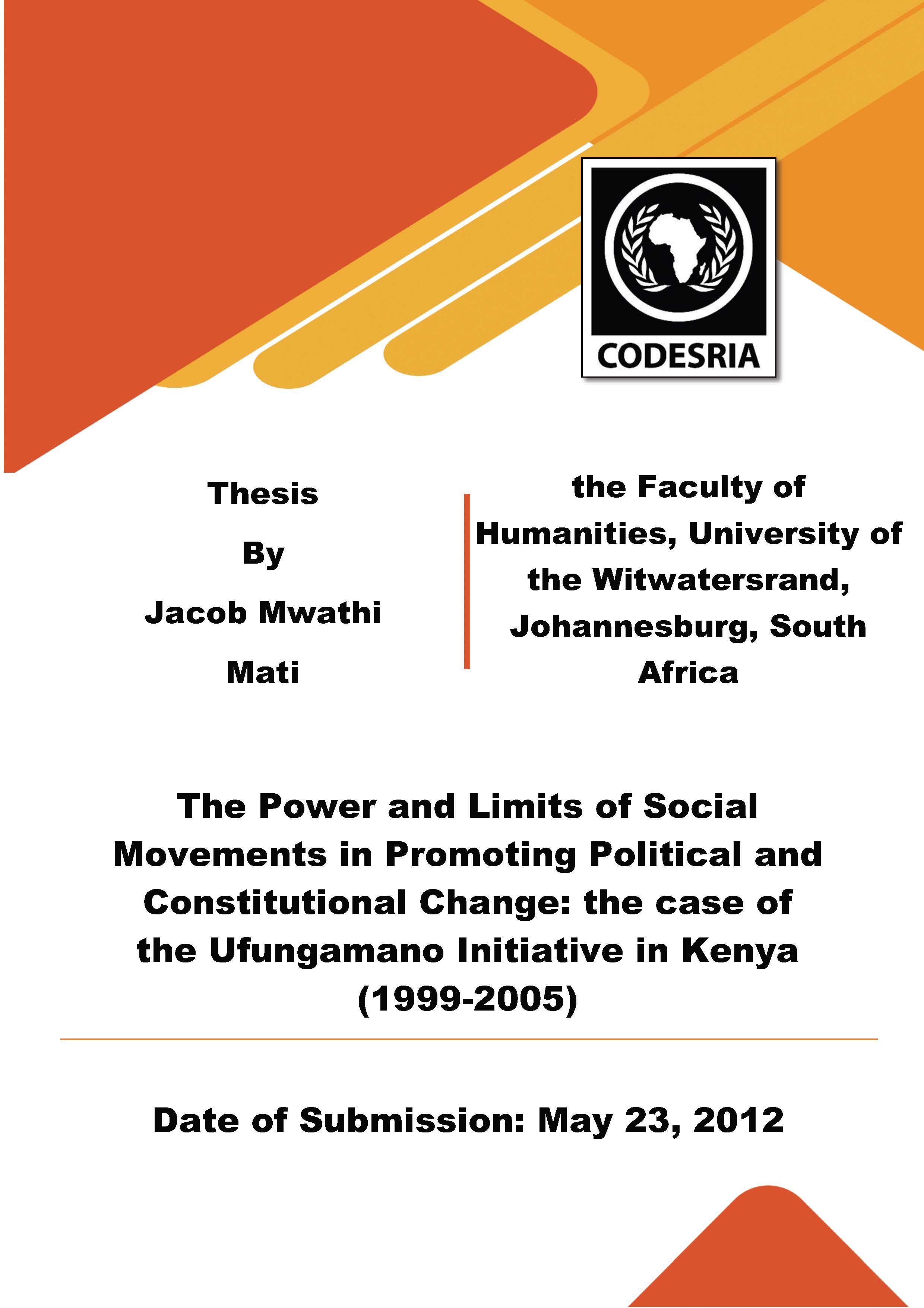The Power and Limits of Social Movements in Promoting Political and Constitutional Change: the case of the Ufungamano Initiative in Kenya (1999-2005)
Keywords:
Social Movements, Civil Society, Citizen Participation, Constitutional Reform Struggles, KenyaSynopsis
The Kenyan political landscape has, since the 1990's, been tumultuous and characterised by multiple political and social struggles centred on embedding a new constitutional order. This thesis is a qualitative case study of the Ufungamano Initiative, a powerful movement involved in these struggles between 1999 and 2005. Emerging in an environment of deep societal divisions and multiple sites of struggle, the Ufungamano Initiative is a remarkable story of how and why previously disjointed and disparate individuals and groups came together in a 'movement of movements' to become a critical contender in Kenyan constitutional reforms. The movement utilised direct citizens' actions and was directly in competition with the Moi/KANU state for control of the Constitution Reform Process. This direct competition and challenge, posed a legitimacy crisis on the state led process forcing an autocratic and intolerant regime to capitulate and open up space for democratic engagement of citizens in the Constitution Reform Process. But the Ufungamano Initiative is also a story of the limits of social movements. While holding
so much power and promise, movements are limited in their ability to effect fundamental changes in society. Even after substantial gains in challenging the state, the Ufungamano Initiative was vulnerable and agreed to enter a 'coerced' merger with the state-led process in 2001. The merger dissipated the Ufungamano Initiative's energy.
This study therefore speaks to the power and limits of social movements in effecting fundamental changes in society. Applying a socio-historical approach, the study locates the Ufungamano Initiative within the broader social, economic and political struggles to argue that contemporary constitutional reform struggles in Kenya were, in Polanyi's (1944) terms, double movement type of societal counter-movements to protect itself from an avaricious economic and political elites. Engaging the political process model, this thesis analyses seventy in-depth interviews and secondary data to explain the dynamics in the rise, operations, achievements and decline of the Ufungamano Initiative as illustrative of how movements emerge, take on a life of
their own and sometimes metamorphose into phenomenal forces of change, or just fizzle out.
Downloads
References
Achebe, C. (1989). 'Spelling our Proper Name.' In James Baldwin and Jules Chametzky (eds.). Black Writers redefine Struggle: A tribute to James Baldwin. Amherst: University of Massachusetts Press.
Acheing', J. (1999). 'Constitution Malting From the Middle,' InterPress Third World News
Agency (IPS), 16 February 1999. Available online at http://www.hartfordhwp.com/archives/36/135.html. (Accessed 02/03/2009).
Afro barometer (2006). Kenyan data. Michigan State University. www.afrobarometer.org
Ajulu, R. (2000). 'Thinking Through the Crisis of Democratisation in Kenya: A Response to Adar and Murunga.' African Sociological Review. Vol. 4 (2): 133-157 http://www.codesria.org/Links/Publications/asr4 2full/ajulu.pdf. (Accessed on 02/03/2009).
Ake, C. (1996). Democracy and Development in Africa. Washington DC: The Brookings Institute.
Akerst0m, N. (2003). Discursive Analytical Strategies: Understanding Foucault, Koselleck, Laclau, Luhmann. Bristol: The Policy Press.
Almond, G.A. (1990). A Discipline Divided: Schools and Sects in Political Science. Newbury Park, CA. Sage Publications.
Aminzade, R.R, Goldstone, J.A., and Perry, J.L. (2001). 'Leadership Dynamics and the Dynamics of Contention.' In Ron, R. Aminzade, Jack, A. Goldstone, Doug McAdam, Elizabeth, J. Perry, William, H. Sewell Jr., Sidney Tarrow, and Charles Tilly (eds.), Silences and Voice in the Study of Contentious Politics. Cambridge: Cambridge University Press. Pp. 126-54.
Amnesty International. (2000). 'Kenya: Freedom of Assembly Under Increasing Threat.'
Amnesty International press release on 28 Nov. 2000, http://www.amnesty.org/en/library/asset/AFR32/015/2000/en/083c5ab6-601b-4929-828c-8fc21f9e752f/afr320152000en.pdf (Accessed 11/02/2009).
Amnesty International. (2001a). 'Kenya: Crackdown on Freedom of Expression Escalates.'
Amnesty International press release on 7 Feb. 2001, http://www.amnesty.org/en/library/asset/ AFR32/003/2001/en/e4bd0al e-eaa6-4b4e-9ed0-7 db 11617bd16/afr320032001 en.pdf (Accessed 11/02/2009)
Amnesty International. (2001 b ). 'Kenya: Tear Gas and Batons Stifle Political Debate.'
Amnesty International press release on 13 Feb. 2001. http://www.amnesty.org/en/library/asset/ AFR3 2/005/200 lien/ d5329ac6-521 f-4b32-86a4-e 1flb4610403/afr320052001 en.pdf. (Accessed 11/02/2009).
Amutabi, M. (2007). 'Intellectuals and Democratisation Process in Kenya.' In Murunga, G.R. and Nasong'o, S.W. (Eds.) (2007). Kenya: The Struggle for Democracy. London: CODESRIA Books, Dakar and ZED Books. Pp. 197-226
Anderson, D. (2002). 'Vigilantes, Violence and the Politics of Public Order in Kenya.' African Affairs. Vol. 101 (45): 531-55.
Anderson, D. (2005). Histories of the Hanged: Britain's Dirty War in Kenya and the End of Empire. London: Weidenfeld and Nicolson.
Andreassen, B.D. & Tostensen, A. (2006). 'Of Oranges and Bananas: The 2005 Kenya Referendum on the Constitution.' Worlci.ng paper 13. Bergen, Norway, Chr, Michelsen Institute (CMI).
Anheier, H.K., & Salamon, L.M. (2006). 'The Nonprofit Sector in Comparative Perspective.'
In Walter W. Powell and Richard Steinberg (eds.). The Nonprofit Sector: A Research Handbook. 2nd ed. New Haven and London: Yale University Press. 89-114






